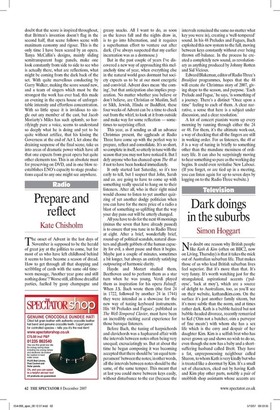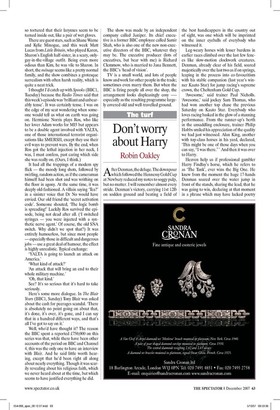Dark doings in the suburbs
Simon Hoggart No doubt one reason why British people like Kath & Kim (often on BBC2, now on Living, Thursday) is that it takes the mick out of Australian suburban life. That makes those of us who lead British suburban lives feel superior. But it's more than that. It's very funny. It's worth watching just for the strangulated, aspirational accents (puloyse', 'luck at moy'), which are a source of delight to Australians, too, as you'll see on their website, kathandkim.com. On the surface it's just another family sitcom, but it's more subtle than the norm, and at times rather dark. Kath is a bubble-haired but not bubble-headed divorcee, recently remarried to Kel (Oim not a butcher, oim a purveyor of fine meats') with whom she has a sex life which is the envy and despair of her daughter Kim. Kim is a selfish brat who has never grown up and shows no wish to do so, even though she now has a baby and a shortsuffering husband called Brett. They have a fat, unprepossessing neighbour called Sharon, to whom Kath is very kindly but who is treated like a doormat by Kim. It's a small set of characters, eked out by having Kath and Kim play other parts, notably a pair of snobbish shop assistants whose accents are so tortured that their larynxes seem to be turned inside out, like a pair of wet gloves.
There are guest stars, such as Shane Warne and Kylie Minogue, and this week Matt Lucas from Little Britain, who played Karen, Sharon's English half-sister, in a scary, onlygay-in-the-village outfit. Being even more odious than Kim, he was vile to Sharon. In short, the ménage seems like a pretty normal family, and the show combines a grotesque surrealism with often harsh reality, which is quite a neat trick.
I thought I'd catch up with Spooks (BBC1, Tuesday) because the Radio Times said that this week's episode was 'brilliant and unbearably tense'. It was certainly tense. I was on the edge of my seat wondering when someone would tell us what on earth was going on. Hermione Norris plays Ros, who like her lover Adam works for MI5 but appears to be a double agent involved with YALTA, one of those international terrorist organisations like SMERSH, except they use their evil ways to prevent wars. By the end, when Ros got the lethal injection in her neck, I was, I must confess, past caring which side she was really on. (Ours, I think.) It had all the trappings of a modern spy flick — the moody long shots, followed by swirling, random action, as if the cameraman himself had been shot and was writhing on the floor in agony. At the same time, it was deeply old-fashioned. A villain saying 'Tea?' in a sinister voice that Dr No would have envied. Our old friend the 'secret activation code'. Someone shouted, 'The logic bomb is spreading!' Luckily Ros survived the episode, being not dead after all. (I switched syringes — you were injected with a synthetic nerve agent.' Of course, the old SNA switch. Why didn't we spot that?) It was entirely humourless, but since most people — especially those in difficult and dangerous jobs — use a great deal of humour, the effect is highly unrealistic. Typical exchange: 'YALTA is going to launch an attack on America.'
'What kind of attack?'
'An attack that will bring an end to their whole military machine.'
'Oh, that kind.'
See? It's so serious that it's hard to take seriously.
Here's some more dialogue. In The Blair Years (BBC1, Sunday) Tony Blair was asked about the cash for peerages scandal. 'There is absolutely no point going on about that, it's done, it's over, it's gone, and I can say that in a hundred different ways, and that's all I've got to say on it.'
Well, who'd have thought it? The reason the BBC spent a reported £750,000 on this series was that, while there have been other accounts of the period on BBC and Channel 4, this was the only one to have an interview with Blair. And he said little worth hearing, except that he'd been right all along about nearly everything. Though it was scarily revealing about his religious faith, which we never heard about at the time, but which seems to have justified everything he did.
The show was made by an independent company called Juniper. Its chief executive is a former BBC employee called Samir Shah, who is also one of the new non-executive directors of the BBC, whatever they may be. The executive producer (lots of executives, but bear with me) is Richard Clemmow, who is married to Jana Bennett, the BBC's 'head of vision'.
TV is a small world, and lots of people know and work for other people in the trade; sometimes even marry them. But when the BBC is firing people all over the shop, the arrangement looks displeasingly cosy — especially as the resulting programme largely covered old and well-travelled ground.


























































 Previous page
Previous page